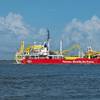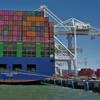The first of three Military Sealift Command (MSC) ships set to carry Army cargo to Iraq this month began loading here April 3.
The cargo belongs to the Third Infantry Division’s Second Brigade Combat Team and Combat Aviation Brigade of Ft. Stewart/Hunter Army Airfield, Ga., which will deploy to Iraq later this year.
Container ship MV American Tern, a privately owned, U.S.-flagged ship under long-term charter to MSC, is currently using three shipboard cranes to load 550 pieces of cargo consisting mostly of 20-foot containers.
In addition, MSC’s large, medium-speed, roll-on/roll-off ships USNS Watson (T-AKR 310), and USNS Charlton (T-AKR 314) will load thousands of pieces of military equipment, including helicopters, Humvees, tanks and trucks. The ships are moving enough equipment to fill nine football fields. Almost as large as aircraft carriers, these ships, also called LMSRs, were built in the 1990s specifically to quickly load, transport and offload large amounts of heavy Army equipment.
“The standard load time for an LMSR is four days. But, depending on the amount and type of cargo, we can often complete it much more quickly,” said Tom D’Agostino, the MSC representative who oversees such operations at three major ports on the East Coast. “We are able to load these LMSRs so quickly because we have a precisely coordinated plan for maneuvering tanks, trucks and other rolling stock through the system of internal ramps linking the ships’ seven wide-open cargo decks.”
MSC and the Army’s 841st Transportation Battalion, based in Charleston, S.C., developed the plans for stowing and loading the equipment and are overseeing the work on all three ships.
Since Sept. 11, 2001, MSC has transported 95 million square feet of dry cargo and 10 billion gallons of fuel -- more than 90 percent of all military cargo deployed in support of the global war on terrorism.
Watson and Charlton are two of 19 LMSRs owned by MSC and operated by civilians working for private companies under contract to MSC. These ships transport combat equipment and supplies, and preposition military supplies in strategic locations around the world.
MSC operates approximately 110 noncombatant, civilian-crewed ships that replenish U.S. Navy ships, chart ocean bottoms, conduct undersea surveillance, strategically preposition combat cargo at sea around the world and move military equipment and supplies used by deployed U.S. forces.
Military Sealift Command Ships Load Equipment Bound for Iraq
Featured videos

Tracking Foreign Vessels Working in the U.S. Jones Act Market

Inside the Electrified Truckable Tug

Inmarsat Enhances Service to Drive Digitalization
Subscribe for
Maritime Reporter E-News
Maritime Reporter E-News is the maritime industry's largest circulation and most authoritative ENews Service, delivered to your Email five times per week









